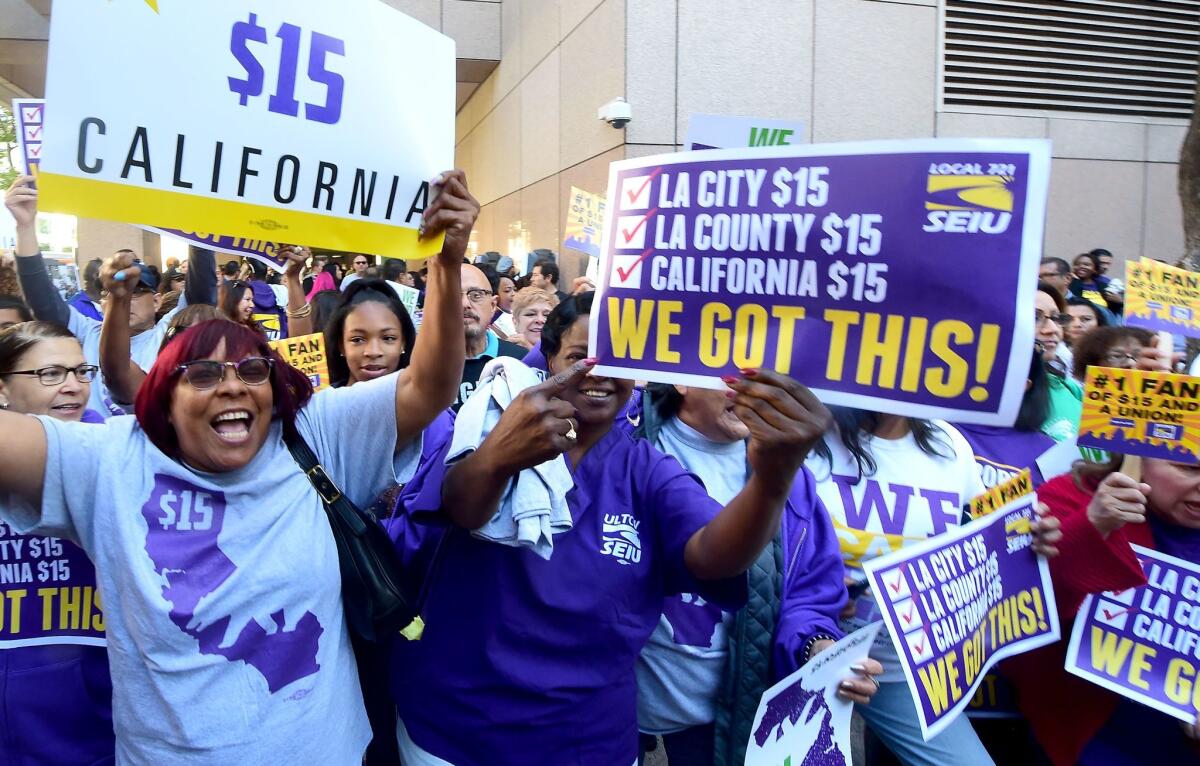In Theory: Is there a moral component to a living wage?

Workers celebrate outside the Ronald Reagan State Building in downtown Los Angeles, where California Governor Jerry Brown signed the bill that will raise the state’s minimum wage to $15 an hour by 2022 while surrounded by supporters and politicians in Los Angeles, California on April 4, 2016.
Just days after New York and California acted to increase their minimum wage to $15 an hour, dozens of faith leaders stood in solidarity, calling for U.S. presidential candidates to make a “living wage” for low-income workers a part of their campaign agenda.
In an “Interfaith Call for Moral Action on the Economy,” released in honor of the legacy of Dr. Martin Luther King, Jr., and on the anniversary of his death, the group defines “model employers” as those that “pay a living wage of at least $15 an hour, provide decent benefits and allow workers to organize without retaliation.”
MORE: Read past In Theory discussions>>
The coalition includes faith leaders representing Islam, Christianity, Judaism, Unitarianism and more.
“The U.S. Government continues to be America’s leading low-wage job creator,” the statement said. “This is unjust and immoral.”
“When low-wage workers don’t make enough to provide for their most basic needs, it is not just an economic issue — it is a moral crisis,” said Rabbi Jason Kimelman-Block, the director of Bend the Arc Jewish Action.
Q: Do you agree with this call for action? Is raising the minimum wage in America a moral imperative?
The Bible says, “The worker deserves his wages” (1 Tim 5:18). The context of this passage is regarding church pastors, but it could apply to anyone who gives their time to a job in exchange for a living wage. We don’t usually enter ministry for money, since pastor salaries rarely keep pace with the cost of living, but still, we live in a world that runs on money, and everyone from field hand to businessman needs it.
Determining value for money is the thing, however, and disparity in wealth distribution is tremendous. I’m amazed that men professionally playing childhood games earn millions of dollars, and those who pretend characters in stories for our televised amusement are similarly compensated and idolized. Meanwhile, the folks producing our food, shelter and clothing (the three most basic needs) often earn the least of all, and sometimes find themselves on government aid.
Now I remember as a middle-schooler delivering the Pittsburgh Press, making just enough money for comic books and ice cream. Later, for $1.70 an hour, I executed menial tasks at an Italian restaurant. As a senior in high school, I worked at McDonald’s (like a lot of other teenagers) and all these jobs were understood to be kid jobs; jobs to get you used to working and to build a work history for eventual “real jobs” — career jobs.
Where do we get off giving paperboy jobs to grown men with cars, high school jobs to moms and dishwasher/ busboy jobs to guys with families they’re supporting in foreign countries? With adults filling base-level positions, it’s a wonder that they do survive without additional allowance from their parents. But this is part of what puts us into our current problem.
Are we now having to stand in as parents? I wonder if this is really so much a spiritual issue for religions to champion, as it is an economic issue that needs to be mathematically and politically restructured by our governors. Perhaps there also needs to be a state brokerage that can match appropriate jobs to salaries with the correct capable-unemployed demographic.
Spiritually speaking, people should be paid for the jobs they do, and they should be rightly treated. It is moral to pay fairly, and it’s good to treat even the least among us with equal respect. Employers should not reap obscene profits at employee expense, and churches should be vocal about perceived inequities. In the current situation, however, I fear that the very work force clamoring for a higher minimum wage will itself become minimized by 2022, as businesses will compensate by outsourcing and automating. Consequently, we can all just forget about the next generation of kids.
Rev. Bryan A. Griem
Tujunga
--
Yes, I believe raising the minimum wage is a moral imperative. If you think about it, isn’t it true that those at the bottom of the economic ladder suffer the most?
MORE: Read more from the Opinion section >>
There’s an old saying, and that is that the fecal material (I’m cleaning this up) rolls downhill. My wife and I happen to own our home, and if you own your home you are aware of the financial breaks you get, such as tax refunds most years. We have also rented, but I like owning better. And why wouldn’t I? “The system” treats you better if you are a property owner.
I have heard the argument that “entry level” jobs aren’t supposed to be career positions. But that’s a fallacious argument. What if you can never get another position because you are locked in? Just as democracy is the best form of government, even with all its frustrations, I also believe that capitalism is the best form of economic system.
Neither, however, is perfect, and as believers — even as fellow human beings — each of us needs to worry about whether our “brother” is being fairly treated, including in the economic sector.
In the book of Genesis, after Cain has killed Abel and God comes looking for Abel, Cain asks, “Am I my brother’s keeper?” There is no answer, but the implication is, yes, you are.
John Donne wrote, “No man is an island.” He was implying that we humans are in this together, and it behooves each one of us to be concerned for our fellow human beings, including whether they get to make a living wage.
Rev. Skip Lindeman
La Cañada Congregational Church
La Cañada